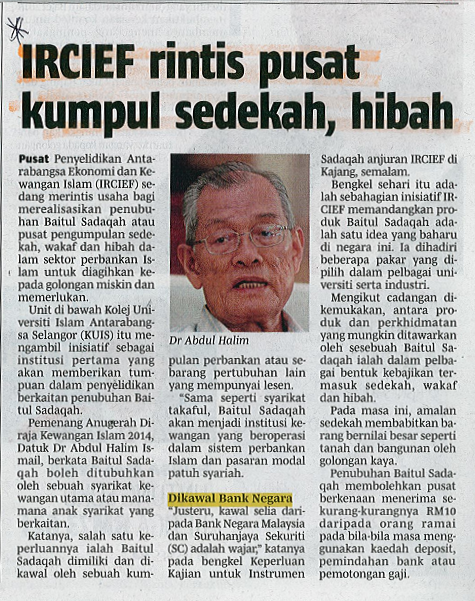English translation follows:
International Research Centre for Islamic Economics and Finance (IRCIEF) is pioneering the researches on sadaqah, waqaf and hibah in the Islamic banking sector to pave the way for the establishment of Baitul Sadaqah. As one of the research centres at International Islamic University College Selangor (KUIS), IRCIEF is setting its objective to be the first institution that gives focus on researches in the areas of sadaqah, waqaf and hibah in the Islamic banking sector.
According to Datuk Abdul Halim Ismail, the recipient of the Royal Award for Islamic Finance 2014, Baitul Sadaqah can be established by any financial institutions or its relevant subsidiaries. He further explained, one of the requirements to establish a Baitul Sadaqah is it should be owned and controlled by a group of banking institutions or any other licensed institutions. “Similar to a takaful company, Baitul Sadaqah will be a financial institution that operates within the Islamic banking system and shariah compliant capital market.
Regulated by the Central Bank
“Therefore, regulation by the Central Bank of Malaysia (BNM) and the Securities Commission (SC) is necessary,” he said during the Workshop on Requirement/ Needs Study for Sadaqah Instrument organised by IRCIEF in Kajang, yesterday. The one-day workshop was part of IRCIEF’s initiative to discover and develop more knowledge with regard to sadaqah, and Baitul Sadaqah in particular, since it is considered to be something new in this country. It was attended by a few selected experts from various universities and also from the industry. Based on the proposal presented, among the products and services that would be offered by a Baitul Sadaqah are various forms of charity including sadaqah, waqaf and hibah.
Today, the practice of sadaqah involves high-value properties like land and buildings donated by wealthy individuals. However, with the establishment of Baitul Sadaqah, it enables the general public to make sadaqah for as low as RM10 at any time using various means of transaction like cash deposit, cash transfer and through salary deduction.

